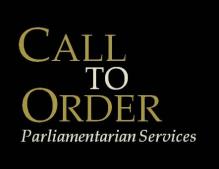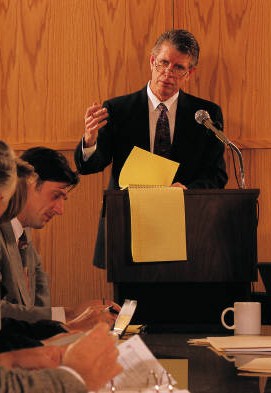In Mr. Smith Goes to Washington, the naïve Mr. Smith yields the Senate floor out of courtesy to a colleague, In doing so he loses his ability to debate on his legislation to prevent graft and corruption, Mr. Smith learned the hard way about the importance of knowing procedural rules. Officers and members of boards and and associations need to know the rules of order to achieve their goals and help their enterprises succeed. Our expertise includes:
- Meeting and Session Governance Services
- Presiding Officer Services
- Delegate Convention or Assembly Services
- Strategic Procedural Planning Services
- Bylaw Drafting, Review, and Revision Services
- Written Opinions Services
- Training Programs
When passions run deep on an issue that comes before a meeting, members can sometimes get animated to a point where they are unruly. The chairman’s job is to prevent that from happening or when it does to extinguish the flames as quickly as possible. Here are some tips on how to keep passions in check while still allowing strong debate to take place.
First, debate is critically important to making informed decisions. Open and free debate allows opinions and information to bear on whether a course of action should be taken. So the chairman has a responsibility to be sure that members follow the rules and that no one gets out of line.
The rules in debate are pretty straight forward and fairly easy to understand. First, members must address remarks to the chairman and to other members of the meeting. That is, one member should not directly speak to another member. Second, members must refrain from attacking motives or characters of other individuals. Third, members must confine remarks to the question at hand. Fourth, members must refrain from speaking on past decisions, and finally to read reports only with permission as reading a report can be quite time consuming. The chair must apply these rules in a fair and objective manner.
As the chair, you need to be familiar with who gets to speak and when. These too are simple and easy to understand. The member that makes a motion should have the first opportunity to speak on the motion. Beyond that, members who rise first who have not yet spoken come next. That is, if a member has already stated a position, then they may not speak again until all who have wanted to speak on a question have had a chance.
A final rule is that the opportunity to speak should alternate between the proponents and the opponents. That it, the maker of the motion, a proponent, should go first followed by an opponent, and then followed by a proponent. There are not always the same number of people in favor as opposed who wish to speak at the same time so alternating may not always be possible. But the chairman must give due consideration of individuals on both sides of the question.
A chairman may take steps to be sure that members follow the rules of debate. The first is to take time to review the rules. Often times members of a meeting either don’t know these rules or they have forgotten them since the last meeting which may have been a year or more ago. You can either review these rules at the start of a meeting or send a list of these rules along with the meeting notice.
Another way to provide appearance of objectivity is to simply greet members as they come into the meeting hall. If members get a sense that you are interested in fair play, you gain the good will of the assembly. That leads to respect which generally leads to members willing to play by the rules.

© 2011-2012 Call to Order Parlimentarian Service
How does a chairman keep a hot meeting under control?


